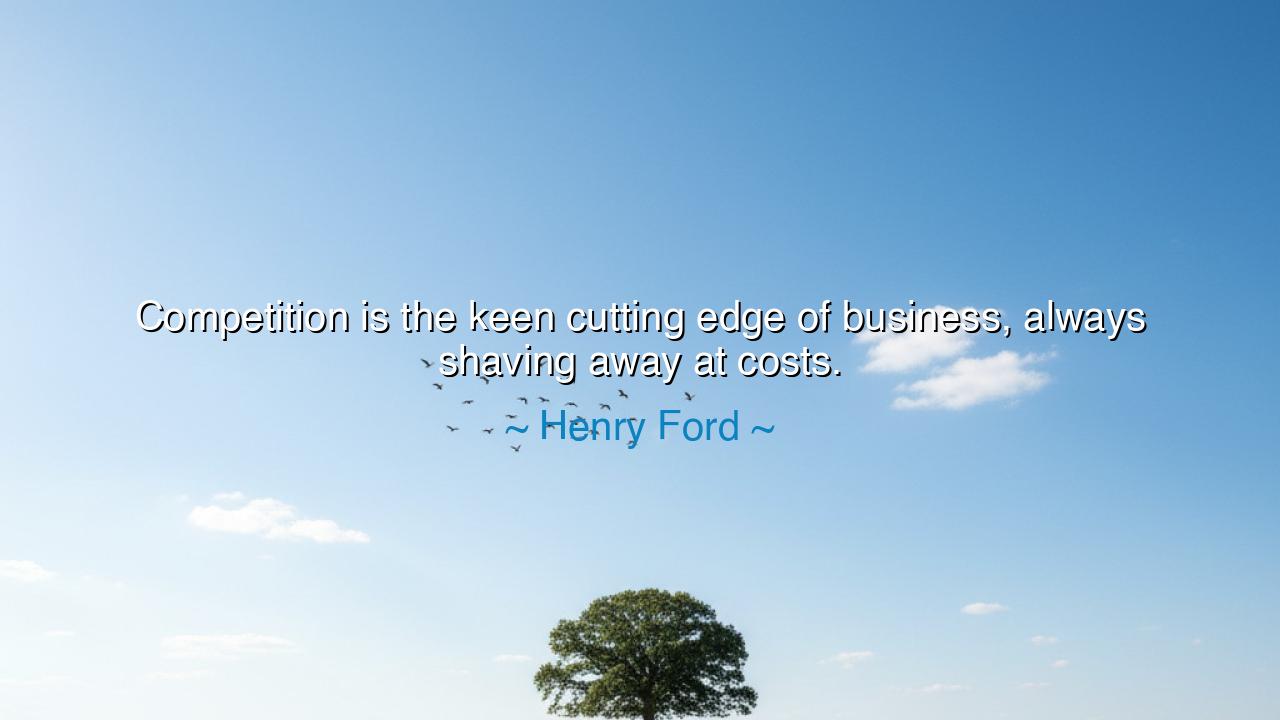
Competition is the keen cutting edge of business, always shaving






Opening Scene – Narrated by Host
The room was quiet, the soft hum of the outside world filtering through the windows. Jack sat at his desk, looking at a quote that had caught his attention. The words had a sharpness to them, a reminder of the competitive nature of business and the constant pressure to improve.
Jeeny entered the room, noticing Jack’s thoughtful expression as he stared at his computer screen. She took a seat across from him, setting down a cup of tea.
Jeeny: “You seem lost in thought. What’s on your mind?”
Jack turned to her and smiled, picking up his tea before speaking.
Jack: “I was thinking about something Henry Ford said: ‘Competition is the keen cutting edge of business, always shaving away at costs.’ It made me reflect on the nature of competition in business. It’s not just about being better than others—it’s about pushing yourself to do more with less, to be more efficient and cost-effective. It’s a constant drive to refine and improve.”
Jeeny nodded thoughtfully, considering the implications of the quote.
Jeeny: “That’s such a powerful way to put it. Competition forces businesses to be leaner, smarter, and more innovative. It’s like Ford is saying that competition keeps you on your toes. It challenges you to continuously look for ways to cut costs, improve your processes, and ultimately deliver more value without wasting resources.”
Jack: “Exactly. In business, competition is what drives progress. It forces companies to stay sharp, to continually assess what’s working and what’s not, and to find ways to operate more efficiently. Without competition, there would be less incentive to improve, to innovate, or to cut unnecessary costs.”
Host: Their conversation deepened as Jack and Jeeny explored the dynamic relationship between competition and business. Ford’s words weren’t just about reducing costs—it was about the broader impact of competition on a company’s drive to evolve and adapt in an ever-changing market.
Jeeny: “It’s interesting how competition doesn’t just push companies to be better in one area—it challenges them to be better across the board. It forces them to innovate, to streamline operations, to provide better products and services—all while keeping costs under control. Without competition, businesses might get complacent, relying on outdated methods and failing to adapt.”
Jack: “Right. And it’s not just about cutting costs for the sake of it—it’s about finding smarter ways to do things. Competition makes you look at your business with a critical eye, constantly seeking areas where you can improve. It’s like having a constant feedback loop, pushing you to refine and rethink your strategies.”
Jeeny: “And that’s where the value of competition really comes in. It’s not just about being better than your competitor in a single area—it’s about being consistently better overall. It’s about building a culture of continuous improvement.”
Host: Jack smiled, feeling the weight of their conversation settle in. Ford’s words were a reminder that competition wasn’t just an external force—it was a driving force within businesses, pushing them to constantly refine, improve, and stay ahead. In this sense, competition was more than just rivalry—it was a tool for growth and efficiency.
Jack: “So, maybe the takeaway here is that competition isn’t something to fear—it’s something to embrace. It pushes us to do better, to be more efficient, and to constantly improve. Without it, we’d lose that drive to innovate and evolve.”
Jeeny: “Exactly. It’s the sharp edge that keeps us from getting complacent. It challenges us to always be looking for ways to do things better, even when we think we’ve reached the top. Competition helps us stay hungry, stay agile, and ultimately, keep moving forward.”
Climax and Reconciliation
The room felt more focused now, as Jack and Jeeny reflected on the true meaning of Ford’s words. Outside, the world continued its steady rhythm, but inside, they had discovered something deeper: competition wasn’t just a pressure—it was a catalyst for growth. It pushed businesses to continuously refine and improve, to be smarter and more efficient, and to deliver more value in an ever-changing landscape.
Jack: “So, maybe the key to thriving in business is not just about keeping up with the competition—but about using that competition to fuel constant improvement. It’s about embracing the challenge to refine, innovate, and keep pushing the limits of what we can do.”
Jeeny: “Exactly. When we see competition as a tool for growth rather than a threat, it shifts our perspective. We become more focused on continuous improvement, which is what ultimately leads to success in the long run.”
Host: The conversation settled into a quiet understanding. Competition wasn’t something to be avoided or feared—it was a driving force that shaped businesses, pushing them to constantly evolve and improve. It was the sharp edge that kept them from stagnating, forcing them to adapt and innovate in order to stay ahead.






AAdministratorAdministrator
Welcome, honored guests. Please leave a comment, we will respond soon